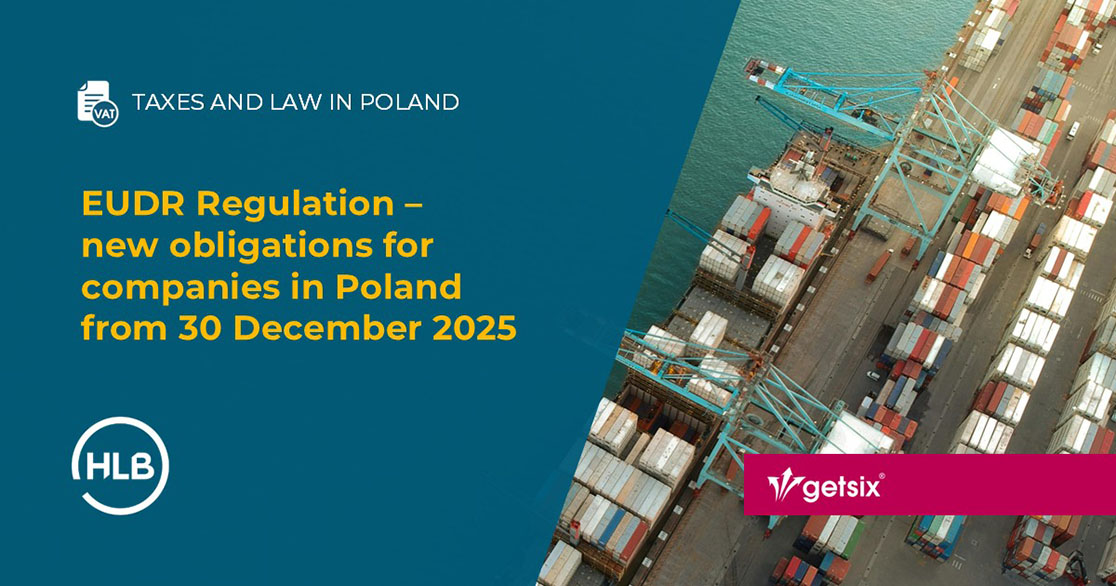EUDR Regulation – new obligations for companies in Poland from 30 December 2025
12 November 2025
12 November 2025

The EUDR Regulation (EU Deforestation Regulation, Regulation (EU) 2023/1115) is one of the most important EU tools in the fight against global deforestation and forest degradation. Its aim is to ensure that products placed on the EU market or exported from it do not originate from areas deforested or degraded after 31 December 2020.
The new rules will apply from 30 December 2025 for large and medium-sized enterprises. For micro and small enterprises, the transition period is planned to be extended until 30 June 2026, in line with the European Commission’s formal proposal of October 2025.
The EUDR covers a wide range of producers, importers and distributors of goods containing, among others, timber, rubber, palm oil, cocoa, soy, coffee, as well as cattle and derived products (e.g. beef, leather, furniture, paper products and chocolate products).
The EUDR Regulation requires companies to develop and implement a due diligence system to ensure full traceability of raw materials and minimise the risk of products being linked to deforestation.
Every company covered by the regulation will be required to:
The scope of responsibilities depends on the size of the company and its role in the supply chain (operator or trader). It is particularly important to establish rules for cooperation with suppliers and the method of providing the required information, including data on the location of plantations or farms.
According to the provisions, the EUDR Regulation covers seven key raw materials and products made from them:
The range of industries that will have to ensure compliance with the EUDR includes, among others, the food, cosmetics, furniture, clothing, automotive and retail sectors.
The EUDR provides for severe penalties for non-compliance with its provisions. Member States are required to introduce effective, proportionate and dissuasive penalties, which may include:
In addition, national authorities will carry out mandatory checks on companies – the number of entities checked will depend on the level of risk assigned to the country of origin of the goods (in accordance with the so-called risk classification system).
The European Commission has developed a benchmarking system that assigns three risk levels to countries of origin of raw materials: low, standard or high.
This level determines the scale of due diligence measures required and the frequency of inspections.
For low-risk countries, the procedure will be simplified, while for high-risk countries, companies will be subject to increased verification obligations.
Companies have less and less time – until 30 December 2025 – to adapt their processes to the new requirements.
Key steps to take now:
These measures will not only ensure compliance with regulations, but also increase the company’s transparency and credibility in the market.
The EUDR Regulation is a key element of the EU’s ESG (Environmental, Social, Governance) policy, particularly in terms of environmental aspects (E).
It supports the implementation of the EU’s sustainable development goals, including climate neutrality and biodiversity protection. Similar to the CSRD directive on non-financial reporting, the EUDR requires companies not only to analyse the environmental impact of their activities, but also to implement specific measures to reduce the negative effects of the economy on ecosystems.
The EUDR, which will apply from 30 December 2025, is one of the European Union’s most significant steps in the fight against deforestation and environmental degradation.
Companies operating in industries based on plant and animal raw materials should already start or complete preparations for the implementation of new procedures.
Failure to comply with the regulations may result in serious financial and reputational consequences, while effective implementation of the EUDR is an opportunity to build transparent, sustainable and responsible supply chains – in line with the values of the green transition of the European economy.
If you have any further questions or require additional information, please contact your business relationship person or use the enquiry form on the HLB Poland website.
***
Download the brochures providing general information and outlining the services that are offered by HLB member firms.
Learn moreClick below for more detailed information regarding population, major towns and cities, language, religion and holidays in Poland.
Learn more